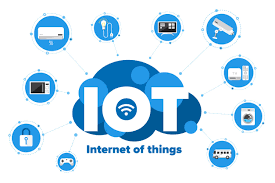info@gladsme.in
+91.8891968718
The Future of Connectivity: Exploring the Internet of Things (IoT)
The Future of Connectivity: Exploring the Internet of Things (IoT)

The Internet of Things (IoT) is revolutionizing the way we live, work, and interact with the world around us. By connecting everyday objects to the internet, IoT enables unprecedented levels of automation, efficiency, and convenience. From smart homes and cities to healthcare and industrial applications, IoT is driving innovation across various sectors.
What is the Internet of Things?
At its core, IoT refers to the interconnection of physical devices, vehicles, buildings, and other objects embedded with sensors, software, and network connectivity. These connected devices can collect and exchange data, allowing them to be monitored and controlled remotely. The ultimate goal of IoT is to create a seamless, interconnected network of smart devices that enhance our lives.
Applications of IoT
Smart Homes: IoT-enabled devices like smart thermostats, security cameras, and home assistants are making our homes more efficient, secure, and comfortable.
Healthcare: Wearable devices and remote monitoring systems are transforming healthcare by providing real-time data on patients' health, leading to better diagnosis and treatment.
Industrial IoT: Factories and industries are leveraging IoT to optimize operations, improve safety, and reduce costs through predictive maintenance and automation.
Smart Cities: IoT technology is being used to manage urban infrastructure, reduce energy consumption, and improve public services, making cities more sustainable and livable.
Benefits of IoT
Increased Efficiency: IoT devices automate routine tasks, leading to significant time and resource savings.
Enhanced Safety: IoT can monitor and detect potential hazards, providing timely alerts and improving overall safety.
Cost Savings: By optimizing processes and reducing waste, IoT can lead to substantial cost reductions for businesses and consumers.
Improved Quality of Life: IoT offers greater convenience and comfort by seamlessly integrating technology into our daily lives.
Challenges and Concerns
While IoT presents numerous benefits, it also brings challenges and concerns:
Security: With more devices connected to the internet, the risk of cyber-attacks increases. Ensuring robust security measures is crucial.
Privacy: The vast amount of data collected by IoT devices raises concerns about privacy and data protection.
Interoperability: The lack of standardization can lead to compatibility issues between different IoT devices and platforms.
The Future of IoT
The future of IoT is promising, with advancements in artificial intelligence, machine learning, and 5G technology set to drive further innovation. As IoT continues to evolve, it will play a pivotal role in shaping a smarter, more connected world.
The Internet of Things is transforming the way we interact with the world, offering endless possibilities for innovation and improvement. By understanding its applications, benefits, and challenges, we can better prepare for a future where IoT plays an integral role in our daily lives.
Related Blogs

The Importance of Data Structures in Software Development
Read More...
Exploring Machine Learning Algorithms: A Beginner's Guide
Read More...
The Evolution of Programming Languages: From Assembly to Rust
Read More...
Understanding Big O Notation: A Guide for Developers
Read More...Subscribe for our Newsletter
Subscribe to elevate your software game! Stay updated on the latest trends, coding insights, and exclusive promotions with our newsletter.
